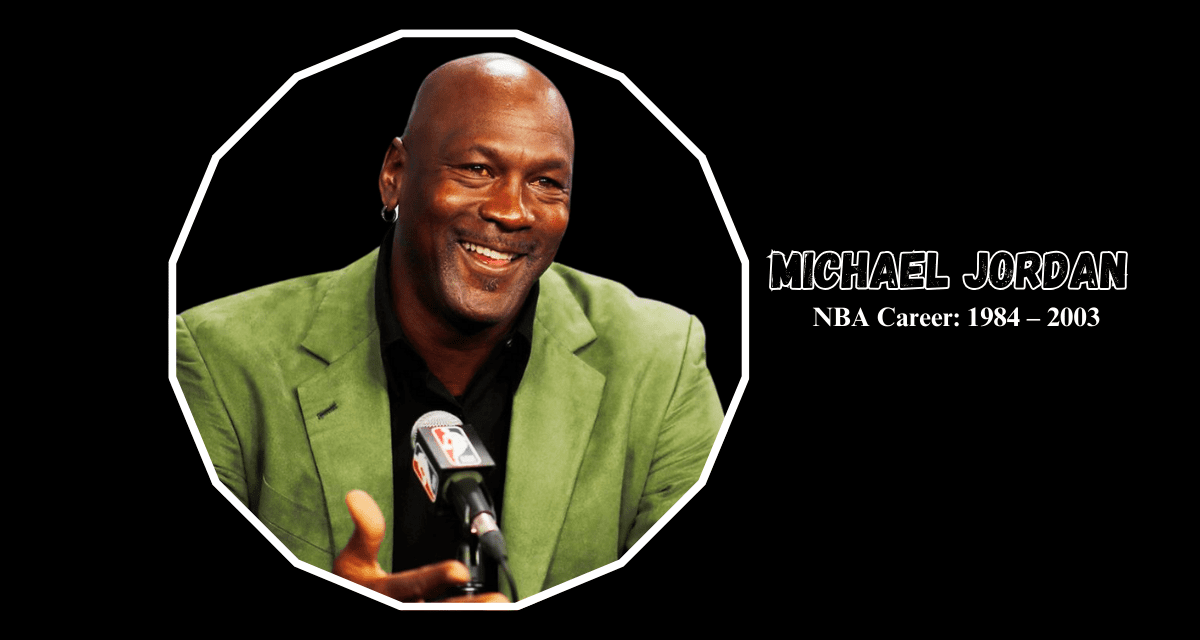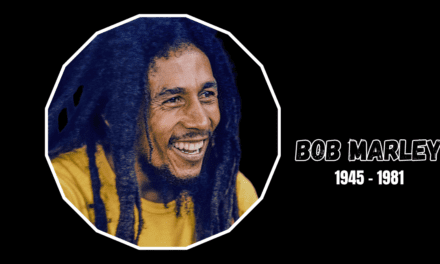Quick Facts
- Birth: February 17, 1963, Brooklyn, New York, USA
- NBA Career: 1984 – 2003
- Teams: Chicago Bulls (1984–1993, 1995–1998), Washington Wizards (2001–2003)
- NBA Championships: 6 (1991, 1992, 1993, 1996, 1997, 1998)
- MVP Awards: 5 NBA Most Valuable Player Awards (1988, 1991, 1992, 1996, 1998)
- • Family: Married to Yvette Prieto, with twin daughters, Victoria and Ysabel; he also has three children from previous relationships.
Early Life and Background
Michael Jeffrey Jordan was born on February 17, 1963, in Brooklyn, New York, but was raised in Wilmington, North Carolina. Growing up in a family that valued sports, Jordan was encouraged to pursue his interests from a young age. Michael’s father, James Jordan, was a powerful influence in his life, teaching him the values of hard work and perseverance. As the middle child of five, Michael grew up with a strong competitive drive, which later became a defining aspect of his successful career.
As a child, Jordan enjoyed playing a variety of sports, including baseball and football. However, it was basketball that truly captured his passion and set the stage for his future. He honed his skills at Emsley A. Laney High School, where he quickly gained recognition for his athleticism and talent on the court. However, despite his skills, he faced challenges in securing a spot on the varsity basketball team as a sophomore, which only fueled his determination to succeed.
College Career at North Carolina
In 1981, Michael Jordan began his college education at the University of North Carolina at Chapel Hill. During his freshman year, he played for the Tar Heels under legendary coach Dean Smith. His skills were evident, and he quickly made an impact on the team. In 1982, he hit the game-winning shot in the NCAA Championship game against Georgetown, solidifying his status as a rising star in college basketball.
During his college career, Jordan delivered impressive performances that helped lead the Tar Heels to an NCAA Championship in 1982. He averaged 17.7 points per game and earned the title of NCAA Player of the Year in 1984. By the time he entered the NBA Draft, he was already regarded as one of the nation’s top prospects.
NBA Draft and Early Career
Michael Jordan was selected as the third overall pick in the 1984 NBA Draft by the Chicago Bulls. Joining a team that had struggled in previous seasons, Jordan quickly became the focal point of the franchise. His electrifying playing style, characterized by soaring dunks and clutch performances, captivated fans and garnered attention from the media.
In his rookie season, Jordan made an immediate impact, averaging 28.2 points, 5.9 rebounds, and 5.3 assists per game. He won the NBA Rookie of the Year Award and was named an All-Star, showcasing his extraordinary talent. Despite his success, the Bulls struggled in the playoffs during his early years, often falling short against tougher opponents.
Rise to Fame
The late 1980s marked a turning point in Jordan’s career. He became known for his relentless work ethic, dedicating himself to improving his game. Jordan’s fierce competitiveness drove him to push his limits, in training and during games. His performance in the 1986 NBA Playoffs against the Boston Celtics, where he scored an astounding 63 points in a single game, is still considered one of the greatest displays of individual talent in NBA history.
In 1989, the Bulls hired coach Phil Jackson, who would play a crucial role in Jordan’s development as a leader and winner. Under Jackson’s guidance, the team adopted a more cohesive playing style, leading to increased success in the regular season and playoffs. By the early 1990s, the Bulls had transformed into a championship-caliber team.
Championship Glory
In 1991, the Chicago Bulls faced the Los Angeles Lakers in the NBA Finals. Jordan’s outstanding performances led the Bulls to victory, securing their first NBA Championship. His ability to perform under pressure and elevate his game in critical moments became a cornerstone of his career. Jordan was named the Finals MVP, solidifying his status as one of the greatest players in the league.
The Bulls went on to win consecutive championships in 1992 and 1993, completing a remarkable three-peat. During this time, Jordan’s popularity soared, and he became a global icon, transcending the sport of basketball. His signature Air Jordan sneakers, produced by Nike, became a cultural phenomenon, influencing fashion and sneaker culture.
Retirement and Return
After the 1993 NBA Finals, Michael Jordan shocked the sports world by announcing his retirement from basketball. The loss of his father, James Jordan Sr., who was tragically murdered earlier that year, deeply affected him. Jordan turned to baseball, a sport his father had encouraged him to pursue. He signed a minor league contract with the Chicago White Sox and played for the Birmingham Barons, a Double-A affiliate.
Although he showed promise on the baseball field, Jordan’s passion for basketball remained. In March 1995, he announced his return to the NBA with a simple phrase: “I’m back.” His return reinvigorated the Bulls, and he quickly reclaimed his position as one of the league’s elite players.
The Second Three-Peat
Jordan’s return marked the beginning of another period of dominance for the Chicago Bulls. With a renewed focus and determination, he led the Bulls to three more NBA Championships in 1996, 1997, and 1998, completing another three-peat. The 1995-96 season is particularly notable, as the Bulls finished with a then-record 72 wins, showcasing their dominance throughout the league.
During this period, Jordan continued to redefine the game with his scoring ability, defensive prowess, and leadership. He won his fourth and fifth NBA MVP awards in 1991 and 1992, solidifying his legacy as one of the game’s all-time greats. His fierce competitiveness and desire to win inspired his teammates and elevated the entire organization.
Final Retirement and Legacy
After the 1997-98 season, Michael Jordan announced his retirement for the second time. His impact on the game of basketball was immeasurable. He had transformed the sport into a global phenomenon, motivating countless young athletes worldwide. Jordan’s influence extended beyond the court, as he became a successful businessman, philanthropist, and cultural icon.
In 2001, Michael Jordan made his NBA comeback, joining the Washington Wizards. Although he was no longer the same dominant player of his prime, he still showcased moments of brilliance and provided valuable leadership to a young team. Jordan played two seasons with the Wizards before retiring for the final time in 2003.
Business and Philanthropy
Beyond his basketball career, Michael Jordan has achieved tremendous success as a businessman. He became the majority owner of the Charlotte Hornets in 2010, making him the first former player to own an NBA team. His involvement in the franchise has allowed him to contribute to the game he loves while further solidifying his legacy.
Jordan is also known for his philanthropic efforts. He actively supports charitable initiatives, including contributions to education, health care, and social justice causes. His commitment to giving back has made a significant impact in various communities, particularly through the Michael Jordan Foundation.
Michael Jordan’s Net Worth
As of 2024, Michael Jordan’s net worth is estimated at $3.2 billion. Much of this wealth comes from his enduring partnership with Nike through the iconic Air Jordan brand, which earns him around $260 million annually in royalties. Additionally, he saw a significant increase in his fortune after selling his majority stake in the Charlotte Hornets for a valuation of approximately $3 billion in 2023. Beyond these sources, Jordan has diversified his investments, including ownership in NASCAR and a stake in DraftKings, solidifying his position as one of the wealthiest former athletes
Legacy
Michael Jordan’s cultural impact is undeniable. He not only changed the way basketball is played but also how it is marketed. His partnership with Nike and the launch of the Air Jordan brand revolutionized the sneaker industry, making basketball shoes a fashion statement. Today, Air Jordans remain one of the most sought-after sneakers globally.
Jordan’s influence extends into popular culture, with appearances in movies, commercials, and documentaries. The documentary series The Last Dance, released in 2020, chronicled his final season with the Chicago Bulls and provided a deep dive into his career and legacy. It captivated audiences and reignited interest in his incredible journey.
Conclusion
Michael Jordan’s journey from a young boy in North Carolina to a global sports icon is a testament to his talent, hard work, and relentless pursuit of excellence. His influence on basketball and popular culture is profound, and his legacy will continue to inspire future athletes. As one of the greatest basketball players of all time, Jordan’s impact on the game and his contributions to society have solidified his place in history.





